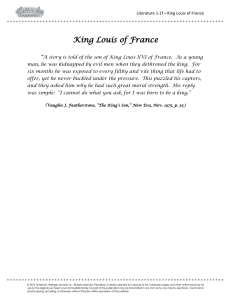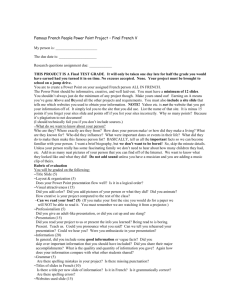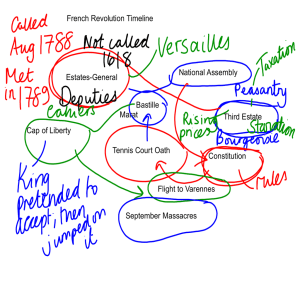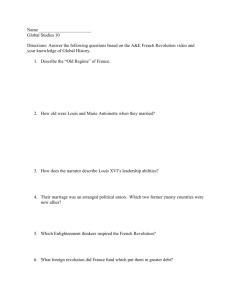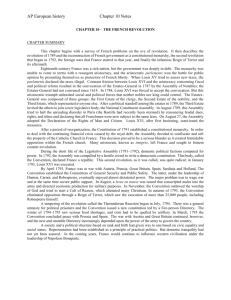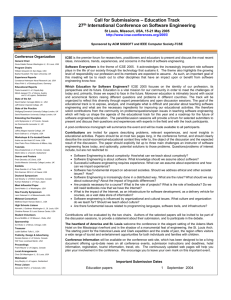Name:Date:Period: Arguments by the Jacobins
advertisement
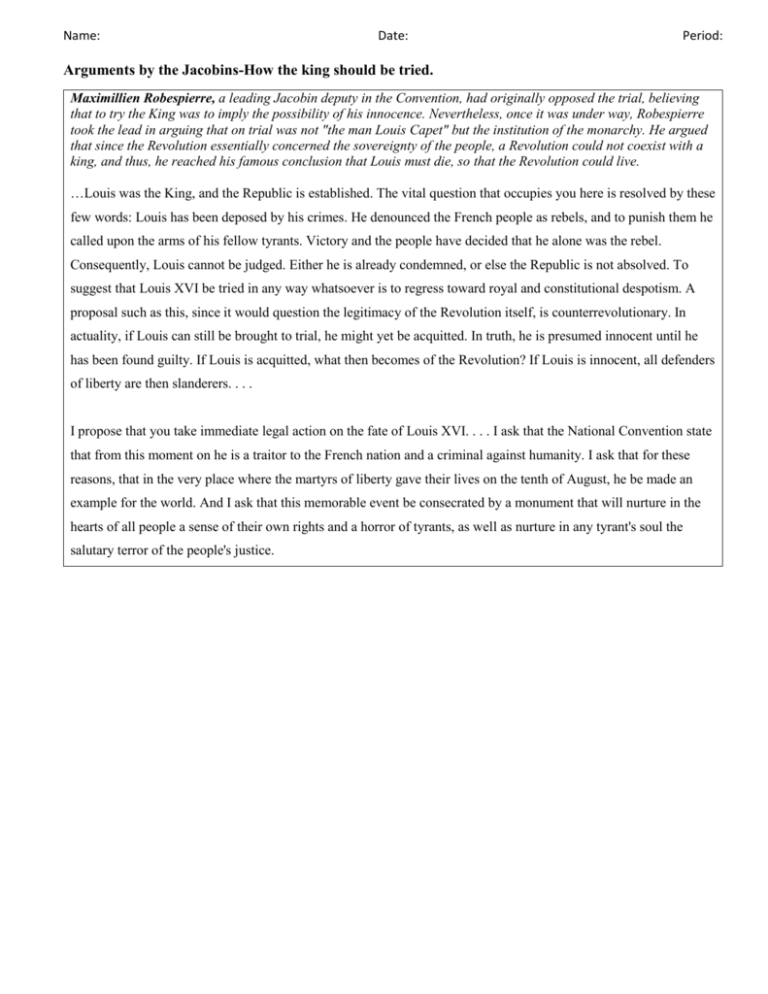
Name: Date: Period: Arguments by the Jacobins-How the king should be tried. Maximillien Robespierre, a leading Jacobin deputy in the Convention, had originally opposed the trial, believing that to try the King was to imply the possibility of his innocence. Nevertheless, once it was under way, Robespierre took the lead in arguing that on trial was not "the man Louis Capet" but the institution of the monarchy. He argued that since the Revolution essentially concerned the sovereignty of the people, a Revolution could not coexist with a king, and thus, he reached his famous conclusion that Louis must die, so that the Revolution could live. …Louis was the King, and the Republic is established. The vital question that occupies you here is resolved by these few words: Louis has been deposed by his crimes. He denounced the French people as rebels, and to punish them he called upon the arms of his fellow tyrants. Victory and the people have decided that he alone was the rebel. Consequently, Louis cannot be judged. Either he is already condemned, or else the Republic is not absolved. To suggest that Louis XVI be tried in any way whatsoever is to regress toward royal and constitutional despotism. A proposal such as this, since it would question the legitimacy of the Revolution itself, is counterrevolutionary. In actuality, if Louis can still be brought to trial, he might yet be acquitted. In truth, he is presumed innocent until he has been found guilty. If Louis is acquitted, what then becomes of the Revolution? If Louis is innocent, all defenders of liberty are then slanderers. . . . I propose that you take immediate legal action on the fate of Louis XVI. . . . I ask that the National Convention state that from this moment on he is a traitor to the French nation and a criminal against humanity. I ask that for these reasons, that in the very place where the martyrs of liberty gave their lives on the tenth of August, he be made an example for the world. And I ask that this memorable event be consecrated by a monument that will nurture in the hearts of all people a sense of their own rights and a horror of tyrants, as well as nurture in any tyrant's soul the salutary terror of the people's justice. Name: Date: Period: As a journalist, Marat had for the first few years of the Revolution supported the monarchy as an institution. Yet he opposed Louis personally; in this text, published in his newspaper, Journal of the Republic (but not delivered before the Convention), he argued for a trial of "Louis Capet," as a man not the King. …The committee on legislation has made clear, by a series of arguments drawn from natural law, from the law of nations, and from civil law, that Louis Capet should be brought to judgment. That step was necessary to instruct the people; for it is important that all members of the Republic be brought to this conviction by those different routes that are suitable to their different spirits. The representatives of the sovereign people can only see the question though the lens of politics. …"The former monarch must be judged; that is beyond doubt; but by whom shall he be judged?" I would reply: by an ordinary state tribunal, composed of the people's direct delegates—if one could confide so important a case to an ordinary tribunal and if a prompt decision were not so important for the public safety. Let there be no more doubt: Louis Capet is still the rallying point for the enemies of liberty, just as he is the source of their hopes. Therefore, he can only be judged by the National Convention which represents the nation itself…. …A final question remains to be examined. How should the former monarch be judged? With pomp and with severity. We are far from those mistaken ideas of clemency and generosity by which the national vanity is flattered! How could they listen to us without laying upon us the blame of the nation and all the ills which would befall the land if we left the former monarch the possibility of plotting again? To grant a pardon would therefore not be merely weakness, but treason, villainy, and treachery. Gentlemen, France's safety and the establishment of the Republic depends on the course you choose. I conclude that the tyrant be judged by the Convention and that his punishment be death.
